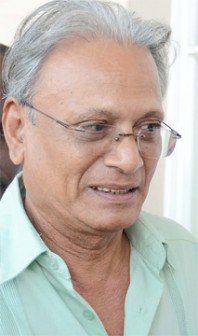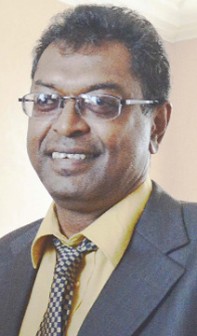Both Dr. Rupert Roopnaraine and Khemraj Ramjattan-the deputy-leader of the main opposition APNU and chairman of the AFC, respectively-told Stabroek News recently that they expect the ruling PPP/C to support the reforms as it has previously accepted them.
The reform of the electoral system is part of a menu of constitutional reforms agreed to by all parties more than a decade ago but whose implementation was slow. The reform process was propelled by the unrest that followed the December 15, 1997 general elections, which led to an escalation of tension and violence. The Herdmanston Accord was subsequently brokered by a Caricom mission, providing for measures that included constitutional reform, which it felt could contribute to a resolution of the existing problems.

But despite advocacy for electoral system reforms by the opposition parties as well as by the African Cultural and Development Association (ACDA)—which blames the ‘winner-take-all’ electoral system for political, social and economic repression—last year’s polls were conducted without the completion of the agreed reforms.
The existing electoral system was intended to be re-worked after the 2001 polls, for which it was crafted as a one-time only compromise by contesting parties. The constitution provides for a system of proportional representation that ensures that the proportion of seats in parliament achieved by each party is as close as possible to the proportion of votes it received from the electorate. While this system produces a proportional house, it has been criticised for sacrificing the needed accountability by MPs to the people who voted for them.
Roopnaraine stressed that APNU wants to move forward on reforming the electoral system so that MPs would be accountable to those who voted for them. He noted that there are two procedures to deal with constitutional matters that they are interested in establishing. One is the parliamentary Standing Committee for Constitutional Reform and he said that they are looking to activate it before the National Assembly goes into recess in August. This standing committee, the APNU chairman said, can deal with the completion of electoral system reform.

Among the constitutional reforms proposed is an electoral system that mixes equally proportional representation and first past the post, for which local authority areas are to be divided into constituencies. This remains to be completed, Roopnaraine noted. He had previously described it as an unworkable compromise and said that if the parties are interested in putting the process in the hands of the people, there should be a first-past-the-post system, with a small number of seats reserved to correct dis-proportionality.
Ramjattan expressed support for the expansion of those MPs elected through first-past-the-post to 50% of the 65-seat National Assembly. He noted that the constituencies would have to be delineated and, saying that the issue is complex, he added that people understand the need for the “hybrid” proportional representation/first-past-the-post system. “People are coming around saying that kind of thing is a better system,” he said. He added that he believes that the PPP will support the reforms.
Power sharing
Meanwhile, Roopnaraine said that the reestablishment of the Constitutional Reform Commission is necessary for “more profound reforms.”
“We want to implement [a] power sharing mechanism,” he said adding that they would seek to make a government of national unity “an imperative of the constitution itself.” Dr. Roopnaraine pointed out that this would have to be put to a referendum. He recalled that some reforms agreed to previously were never carried out because these were supposed to be put to a referendum but this was not done. “At the end of the process we did not go to a referendum,” he said.
For the AFC’s part, Ramjattan said that the party was discussing its agenda for constitutional reform. He said that under focus now is reform of the local democratic organs and the Guyana Elections Commission. Further, he pointed to government’s recent move to the court to seek redress for matters dealt with in the National Assembly, and said that they would also seek to make the doctrine of the separation of powers “more explicit.”
Ramjattan said that the AFC also wants to make some changes in terms of the qualifications of members of parliamentarian and the pledge of allegiance. He explained that some MPs have dual citizenship and they want to ensure that those who have lived in Guyana for a long time, for example, government chief whip Gail Teixeira, would not be affected by their having dual citizenship. “We would want to put in an amendment that would accommodate these people,” he said.
“The immunities of the president is also big on our cards,” Ramjattan added, saying that they would seek to curb these. The AFC chairman said that there are some others that are “very controversial” which he declined to specify. “We have to be gradualist” in our approach, he said while noting that reforms will take time. “That aspect of constitutional reform has to have a cue from all political parties to move forward,” he said.
There has been movement at the tripartite level, Ramjattan said. He noted that the inter-party committee on constitutional and parliamentary reform has been working on some of the reforms and looked at issues such as the independence of parliament and local government reform. “That is making good headway,” he said, while praising the efforts in that regard. Roopnaraine said that the inter-party committee is examining the recommendations of several reports and he noted that they would have to arrive at a consensus since a two-thirds majority necessitating the cooperation of the major parties is required for constitutional reforms. They are trying to reach agreement at the tri-partite level, he said.
Roopnaraine was optimistic that the constitutional reforms, particularly the electoral system reform, would be completed this time around. He added that APNU wants also to look at the procedures for arriving at decisions. With its majority prior to the last elections, the PPP was able to cement its rules governing the arriving at decisions in terms of the reforms and they want to re-examine some of these, he said.





